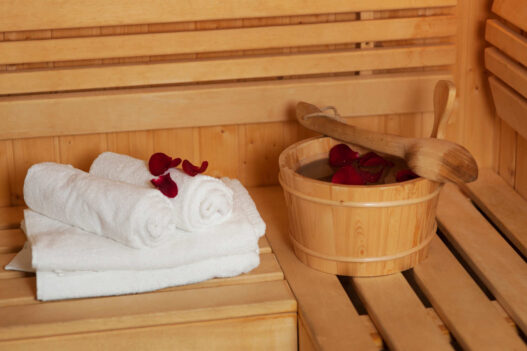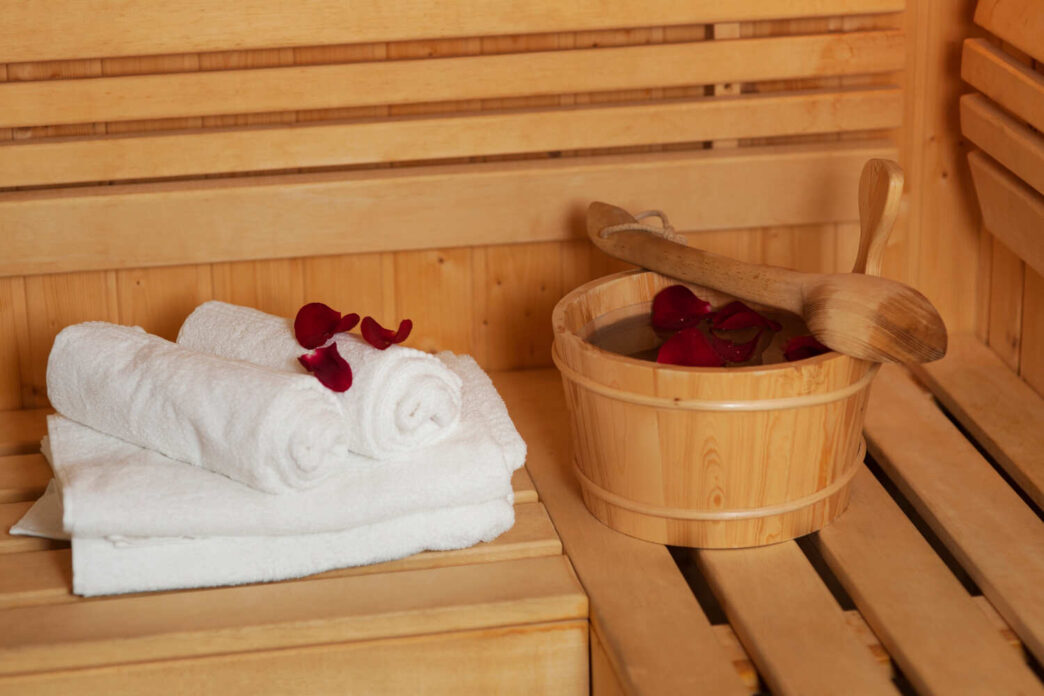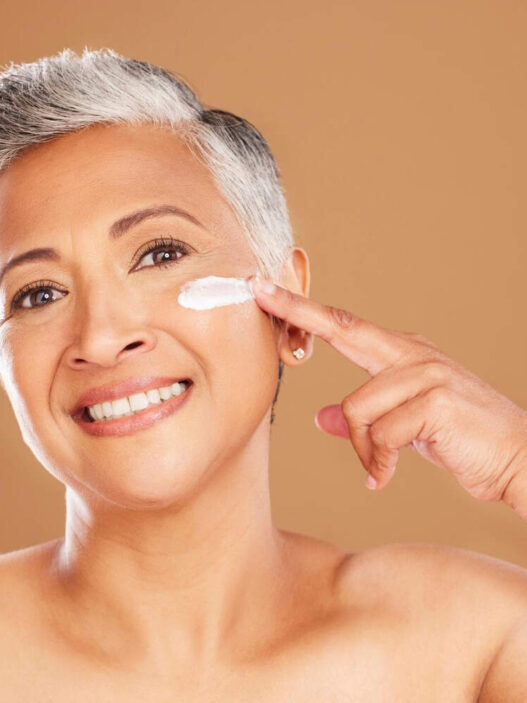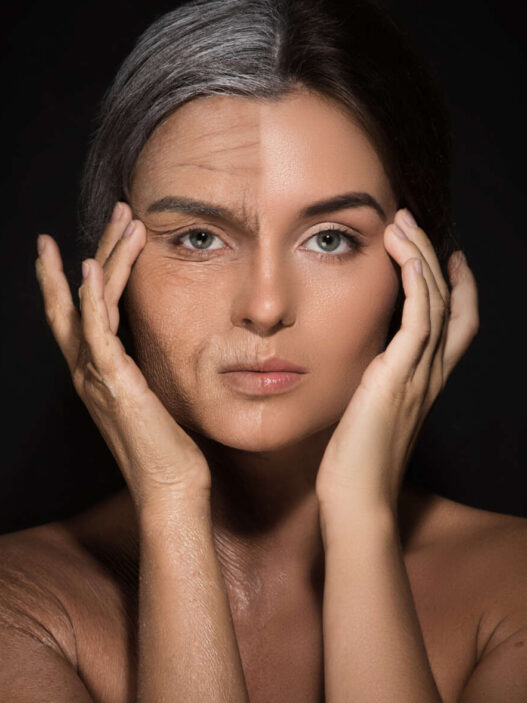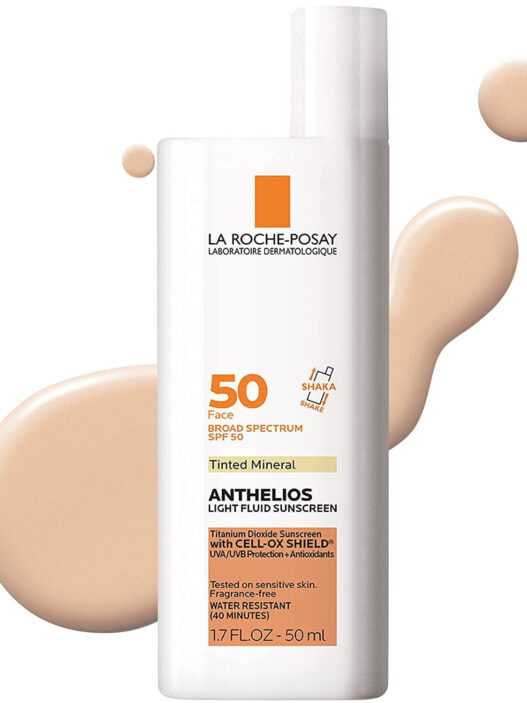Sauna therapy is the process of exposing your body to high heat in an enclosed space, often found in spas, gyms, etc. This form of therapy is said to have originated in Finland in the 10th century and slowly became the modern sauna we know today. People often use the incredibly relaxing process for various health and healing benefits. If you’re thinking of trying out sauna therapy, take a look at these healing benefits you didn’t know about!
Healing Benefits of Sauna Therapy
Let’s talk about the healing benefits of sauna therapy, including physical and mental benefits.
Physical Benefits
There are several physical benefits to using sauna therapy. Here are some of the most notable:
Heart Health
It’s suggested that saunas may be helpful in reducing your risk of developing heart disease. The basic science implies that the high temperatures of saunas allow blood vessels to dilate and improve the blood flow to your heart and throughout your body.
Recovery After Exercise
Many gym-goers use sauna rooms after exercising, so there must be some benefits, right? Saunas are said to relax muscles, therefore minimizing the likelihood of muscle pain after exercising. Similar to heart health, it improves blood circulation and speeds up the body’s natural recovery process.
Flushes Your Body Of Toxins
Sauna therapy is great for flushing your body of toxins. Toxins are commonly absorbed through various things, i.e., cleaning products, perfumes, plastic, etc. When you enter a hot sauna, your body temperature begins to rise, and you will naturally begin to sweat out these toxins.
Encourages Deeper Sleep
It’s theorized that people may experience a deeper and more fulfilling night’s sleep after using a sauna. The calming heat you expose yourself to in a sauna encourages your body to feel relaxed, ultimately resulting in a better night’s sleep.
Muscle Recovery
Again, the high temperatures of saunas encourage blood vessels to open up, and it allows your body to carry oxygen and essential nutrients to your muscles, improving pain relief. This is particularly useful for those who frequently exercise–muscle recovery is vital!
Helps Fight Illness
The process of exposing your body to high temperatures and humidity produces more white blood cells. White blood cells are specifically there to help your immune system, so it’s pretty clear that this process may help you recover quicker from illnesses such as colds, and, in some cases, even influenza.
Burns Calories
Saunas are believed to help you burn a few calories, but keep in mind it’s nowhere near the same amount that exercise will burn. It all links back to the sweating process and the amount of energy that it requires, therefore slowly burning some calories.
Clears Skin
Sweating is a high-cleansing process known to be great for your skin. Producing sweat cleanses pores and glands and also helps, like we mentioned above, flushing out toxins. After a few sauna sessions, you should start to notice an improvement in your skin health. Saunas tend to make you less prone to acne, blemishes, and blackheads.
Mental Benefits
Did you know sauna therapy can also provide mental healing benefits? It’s not just all about the physical; let’s look after our minds, too.
Saunas, infrared especially, are known to relieve mental stress and encourage relaxation as the process balances out your hormone levels.
Also, saunas are pretty similar to exercising–the act of producing sweat releases endorphins and can improve your mood.
Recreation and socialness are two other mental and lifestyle benefits of using saunas. Sauna therapy can, of course, sometimes be a private and personal experience.
On the other hand, you may find saunas where you can socialize with other users and start some insightful conversations. You can meet like-minded people or maybe even connect with someone who has advice that can benefit your health and well-being.
Types of Saunas
There are a few different types of saunas available to choose from, each with its own features, benefits, and downsides. Let’s take a look at the main sauna types below:
Infrared Saunas
This is known to be the most modern type of sauna. Infrared saunas use emitted heaters to warm your body with electromagnetic radiation. This type of radiation is particularly good as it doesn’t pose the same risks as UV radiation, releasing longer wavelengths at shorter frequencies.
Check out this site to get yourself an infrared sauna today.
Dry Saunas
Dry saunas are an example of traditional Finnish saunas, where the sauna originated. Dry saunas have high temperatures but really low humidity. The temperatures will generally reach 176 – 248 degrees Fahrenheit. If you live with a lot of physical pain, this is a great option for reducing your symptoms.
Salt Room
This is a special type of dry sauna, where the walls are lined with blocks of Himalayan salt. Salt rooms are designed to safely inhale and absorb minerals through your skin and respiratory system to improve breathing and skin health.
Steam Baths
Steam baths are another traditional method for using saunas. It’s the opposite of a dry sauna–the temperature is lower (113 – 140 degrees Fahrenheit), but the humidity is higher. Due to lower temperatures, users can stay in steam baths for longer than a typical sauna experience.
Wet Saunas
A wet sauna, or steam room, is another typical kind of sauna that you can find pretty much everywhere these days. Wet saunas generate moist heat and humidity and surround you with clean water vapor. These are great for your skin and lungs, especially if you’re an asthma sufferer.
Conclusion
Sauna therapy has been used for many years and has so many healing benefits, from fighting illness and burning calories to clearing the skin and aiding in muscle recovery.
So, what healing benefits will you be using sauna therapy for? And what type of sauna will work best for you? Consider doing some extensive research before you purchase your own sauna goods to reap all the benefits from your own home.
It’s certainly worth adding some sauna therapy to your routine to reap the incredible healing benefits of this process.
Disclosure – This is an external post and the views expressed are of the sponsor/author/third party and not of Healthieyoo’s editorial team. We disclaim any and all liability to any party, company, or product for any direct, indirect, implied, punitive, special, incidental, or consequential damages arising either directly or indirectly due to the use of content published in this article. The publishers of this website take no responsibility for any health issues, personal injury, death, disability, or any other harm due to the content on our website or any advice or opinion expressed on our website. Please consult your healthcare professional before making any decision related to your health. Please also read our medical disclaimer”.
This is a sponsored post and the views expressed are of the sponsor/author/third party and not of Healthieyoo’s editorial team. Please read our editorial policy, affiliate disclosure, and medical disclaimer.
